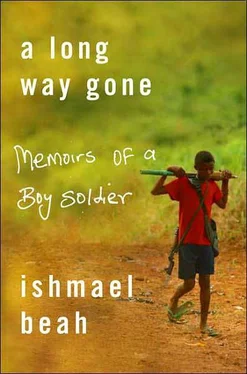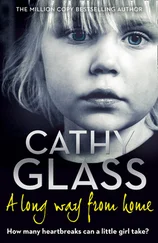We walked on the hot, burning sand until sunset. I have never longed for a day to conclude as I did that day. I thought the arrival of sunset would heal my pain. But as the heat died down, the anesthesia also wore away. Each time I lifted my feet, the veins in them tightened and I felt the sand particles digging into my bleeding soles. The next several miles were so long that I didn’t think I would be able to make it. I perspired and my body shuddered from the pain. Finally, we came upon a hut that was on the sand. None of us was able to talk. We walked inside and sat down on logs around a fireplace. There were tears in my eyes, but I was unable to cry because I was too thirsty to make a sound. I looked around to see the faces of my traveling companions. They were crying as well, without a sound. Hesitantly, I looked under my feet. Peeled flesh hung down and congealed blocks of blood and particles of sand clung to each hanging bit of skin. It looked as if someone had literally used a blade to cut the flesh under my feet from the heel to the toes. Discouraged, I looked into the sky through a tiny hole in the thatched roof, trying not to think about my feet. As we sat in silence, the man whose hut we had occupied came in. He stopped at the door, and was about to turn around when he noticed our suffering. His eyes met our frightened faces. Musa had just lifted his foot and was trying to separate the sand from his flesh. The rest of us were holding our knees so that our feet wouldn’t touch the ground. The man motioned for Musa to stop what he was about to do. He shook his head and left.
A few minutes later, he returned, carrying a basket full of some type of grass. He quietly made a fire and heated the grasses and then placed them underneath each of our hanging feet. The steam from the grass rose to our soles, and it gradually lessened the pain. The man left without saying anything.
Later he returned with fried-fish soup, rice, and a bucket of water. He put the food before us and motioned for us to eat. Again he disappeared, returning a few minutes later, this time smiling widely. He had a fishing net on his shoulder and held a pair of oars and a big flash-light.
“You peekin dem dae feel betteh, right?” Without waiting to hear whether we were feeling better or not, he went on to tell us where the sleeping mats were and that he was going fishing and would be back in the morning. He didn’t even bother to ask our names. I guess he didn’t think it was necessary or important at that moment. Before he left, he gave us ointment to rub on our feet and stressed that we do it before going to sleep. We were very quiet that night. No one said a word.
The following morning our nameless host came again with food and a smile on his face that said he was glad that we were doing fine. We couldn’t walk well, so we just hobbled around the hut and made fun of each other to avoid boredom.
Kanei boasted about being an excellent soccer player. Musa threw him a groundnut shell; Kanei moved his foot to kick it, but then realized that it would hurt and abruptly swung his foot back, dragging it against a stone. He began to blow on his sole, in pain.
“What kind of soccer player are you going to be if you are afraid to kick an empty groundnut shell?” Musa laughed. We all gradually began to laugh.
Musa had a round face, and he was short and bulky, with tiny round ears that matched his face. His eyes were big and looked as if they wanted to leave his face. Whenever he wanted to convince us of something, they would brighten.
Kanei had a long and calm face, and unlike Musa he was skinny and had short, really dark hair that he took great care of every morning, or whenever we stopped at a river or a stream. He would rub water on his head and take his time to carefully arrange his hair. “Are you meeting a girl somewhere?” Alhaji would ask, giggling. Kanei, with his soft yet authoritative voice, always seemed to know what to say and how to handle certain situations better than the rest of us.
Whenever Alhaji spoke, he used elaborate gestures. It was as if he wanted his already long hands to extend toward whomever he was talking to. He and Jumah were friends. They walked next to each other. Jumah was always nodding his head, agreeing to whatever the lanky Alhaji said to him as we walked. Jumah used his head to gesture, rather than his hands. Whenever he spoke, he waved his head left to right. He kept his hands crossed behind his back most of the time, like an old man.
Saidu and Moriba were almost as quiet as I. They always sat next to each other, away from the group. Saidu breathed hard as we walked. His ears were large, and when he was listening, they stood up like a deer’s. Moriba always told him that he must have extra hearing ability. Moriba mostly played with his hands, examining the lines on his palm and rubbing his fingers as he whispered to himself.
I barely spoke.
I knew Alhaji, Kanei, and Musa from my former secondary school. We never talked much about our past, especially our families. The few conversations we had that weren’t related to our journey were mostly about soccer and school before we resumed our silence.
The pains we felt from our feet subsided on the fourth night. We went for a walk around the hut, and during our stroll I found out that the hut was only about half a mile from the main village; at night we could see smoke rising from the tiny village’s cooking huts.
We stayed in the hut for a week. Our host brought us water and food every morning and night. He had the whitest teeth that I had ever seen, and he was shirtless all the time. Sometimes when he came to check on us in the morning, he had chewing sap in his mouth. I asked him one morning for his name. He laughed softly. “It is not necessary. This way we will all be safe.”
The following night, our host decided to take us to a part of the Atlantic Ocean that was nearby. As we walked, he engaged us in conversation. We learned that he was Sherbro, one of the many tribes in Sierra Leone. When he heard the stories of how we had walked from Mattru Jong, he couldn’t believe us. He said he had heard about the war but still had difficulty believing that people could do the things that he had heard they did. Our host had been born in the main village and never left. Traders came to his village with clothing items, rice, and other cooking ingredients to exchange for salt and fish, so he didn’t need to go anywhere. If I had to guess, I would say he was in his early twenties. He said he was going to get married the next month and was looking forward to it. I asked why his hut was removed from the village. He explained that it was his fishing hut, where he kept his nets and other fishing items and where he dried fish during the rainy season.
When we got to the ocean, we walked to an inlet where the sea wasn’t rough. We sat on the banks. “Put you foot nah de wahter, make de salt wahter soakam.” He also said the salt water was good for healing the pain and preventing tetanus. Our host sat aside, looking at us, and each time I looked at him he was smiling and his white teeth stood out against his dark face. The dry breeze from inland coupled with the cool ocean air was perfectly soothing. I wanted to know his name so badly, but I restrained myself.
“You boys must come here every night to put your feet in the ocean. This way you will be healed in less than a week,” he said.
He looked in the sky, where the stars were beginning to be covered by fast-moving clouds. “I have to go take care of my canoe. It will rain soon, so you must go back to the hut.” He started running in the sand toward the main village.
“I wish I could be that man. He is just so happy and content with his life,” Alhaji said.
“He is a very nice man, too. I really want to know his name,” Kanei said softly.
Читать дальше












